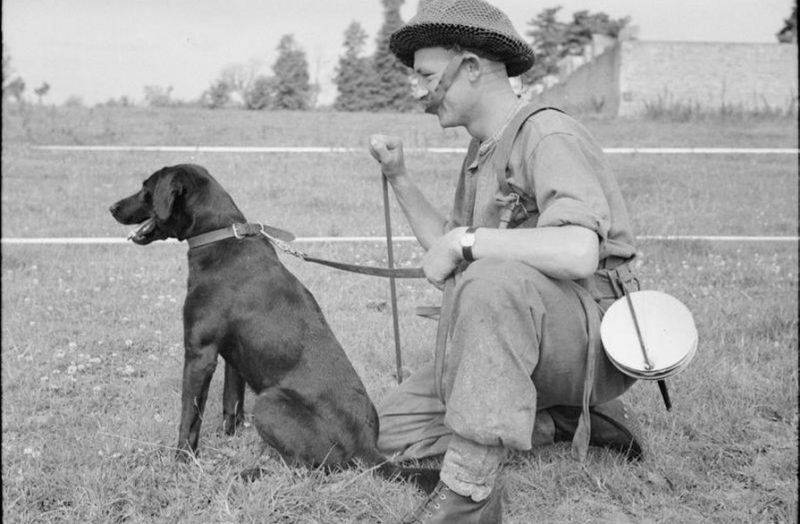In hostile conditions, with bullets and bombs threatening his life, Rex calmly went about his business. He crept through the Reichswald Forest in World War II, seeking out mines laid by the Germans as they retreated.
Through his efforts, Rex saved hundreds of British soldiers’ lives during Operation Veritable in March of 1945. In part due to his work, and the work of other dogs like him, the Allies were able to storm through Germany and defeat the Nazis to end WWII.
He was given the task of clearing the forest before British Prime Minister Winston Churchill visited.
Rex was a black Labrador – a “sniffer dog.”
His platoon commander, Lt. Peter Norbury, wrote, “Rex has always worked with great zest. While on duty in the Reichswald Forest, he worked under the worst of conditions both overhead and underfoot with complete disregard to the very heavy enemy shelling. He helped to clear a pathway through a thickly sown anti-personnel minefield, so saving casualties that would have most certainly occurred but for his devotion to duty.”
When the war ended, Rex was recommended for the RSPCA For Valour Medal.
Rex never received that medal; the War Office discovered that Rex had been a stray before the war. He was killed off the day before he would have received his award. The courage of this remarkable dog was forgotten – until now.
Christy Campbell, a historian and writer, discovered Rex’s story while researching his book, Dogs of Courage. He said, “By 1942, Britain was losing the war, and there was a huge amount of rationing, so there was no food for pets. There was a secret government plan to have them destroyed, but that would have been a blow to public morale.”
Instead, it was decided to run a recruitment program for dogs. Families would loan their dog to the army, where they would be fed and looked after before being returned to their homes at the end of the war. In the meantime, the dogs were trained for a variety of jobs, including sniffing out mines – a role they were very good in.
Norbury worked with 40 sniffer dogs in the war and said, “It’s nice that these remarkable dogs should be remembered, even after 70 years. A lot of the dogs would not work [unless it was quiet], most couldn’t do their job under heavy gunfire. But there were exceptions.”
Rex was one of those exceptions.
Five years ago, a fire at the Ministry of Defence destroyed all of Rex’s military records along with the records of other military dogs from WWII.
Being a stray, Rex would likely have been recruited from Battersea Dogs Home or a police dog pound. Other dogs were lent to the Army by families who could not afford to take care of their pets due to the strict rationing in England.
Rex would have trained at the War Dogs Training School, where Women’s Auxiliaries volunteers would throw bangers and thunder-flashes at the dogs to teach them not to fear gunfire.
Rex was conscripted as one of 30 dogs in No4 Mine Platoon, Royal Engineers. This was the final platoon of sniffer dogs formed by the Allies in the war.
He was sent to France after D-Day. Norbury spent his 21st birthday clearing mines with the dogs. “The Reichswald Forest was horrible. It was cold, it was wet, it was muddy, and it was infested with anti-personnel mines.”
The Germans used cunning tactics to confuse and foil the efforts of the British minesweepers. Wooden or glass mines – which were almost impossible to detect using conventional methods – were used, and steel mines were laid near tramlines so metal detectors were useless.
On March 3, Rex found so many mines that Norbury stated he was the bravest dog he’d ever seen. Then the next day, Rex was sent back out to make sure the forest was clear of mines before Churchill arrived. Three weeks later, Rex was involved in Operation Plunder, again sniffing out mines in the midst of enemy fire.
The RSPCA was ready to honor Rex with a medal, but his citation was canceled by the War Office.
Mr. Campbell says, “That’s the awful bit. It was decided Rex couldn’t have a medal, even though he was the bravest of the lot, as he didn’t really exist. He had no owner. Instead, he was destroyed as a stray by an army vet on government orders.”
Of all the dogs nominated for the RSPCA For Valour Medal, only three have ever received their award.
